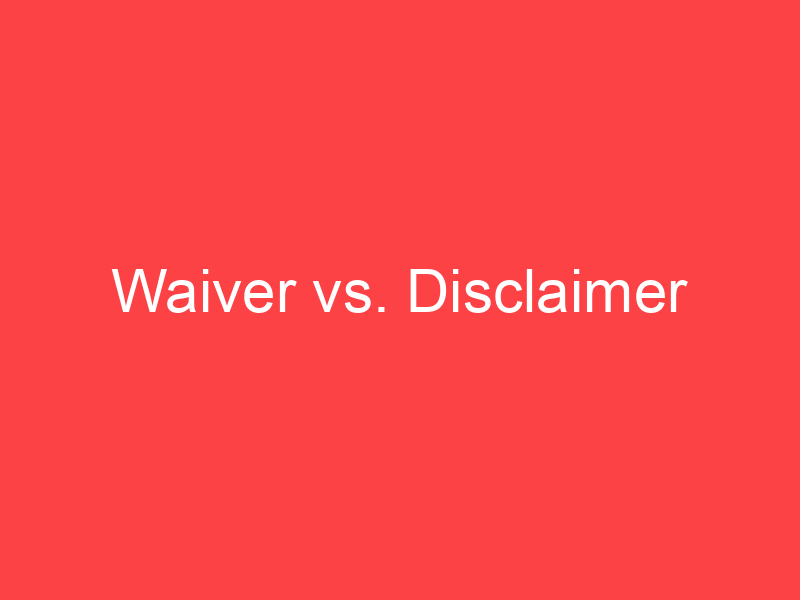-
Waiver
A waiver is the voluntary relinquishment or surrender of some known right or privilege.
Regulatory agencies or governments may issue waivers to exempt companies from certain regulations. For example, a United States law restricted the size of banks, but when banks exceeded these sizes, they obtained waivers. In another example, the United States federal government may issue waivers to individual states so that they may provide Medicaid in different ways than the law typically requires.
While a waiver is often in writing, sometimes a person’s words can also be used as a counteract to a waiver. An example of a written waiver is a disclaimer, which becomes a waiver when accepted. When the right to hold a person liable through a lawsuit is waived, the waiver may be called an exculpatory clause, liability waiver, legal release, or hold harmless clause.
In some cases, parties may sign a “non-waiver” contract which specifies that no rights are waived, particularly if a person’s actions may suggest that rights are being waived. This is particularly common in insurance, as it is less detailed than a reservation of rights letter; the disadvantage is that it requires the signature of the insured.
Sometimes the elements of “voluntary” and “known” are established by a legal fiction. In this case, one is presumed to know one’s rights and that those rights are voluntarily relinquished if not asserted at the time.
In civil procedure, certain arguments must be raised in the first objection that a party submits to the court, or else they will be deemed waived.
-
Disclaimer
A disclaimer is generally any statement intended to specify or delimit the scope of rights and obligations that may be exercised and enforced by parties in a legally recognized relationship. In contrast to other terms for legally operative language, the term disclaimer usually implies situations that involve some level of uncertainty, waiver, or risk.
A disclaimer may specify mutually agreed and privately arranged terms and conditions as part of a contract; or may specify warnings or expectations to the general public (or some other class of persons) in order to fulfill a duty of care owed to prevent unreasonable risk of harm or injury. Some disclaimers are intended to limit exposure to damages after a harm or injury has already been suffered. Additionally, some kinds of disclaimers may represent a voluntary waiver of a right or obligation that may be owed to the disclaimant.
Disclaimers vary in terms of their uniformity. Some may vary depending on the specific context and parties involved, while other types of disclaimers may strictly adhere to a uniform and established set of formalities that are rarely or never modified, except under official authority. Some of these formal disclaimers are required pursuant to industry regulation, qualification for protection under a safe harbor, and other situations where the exact wording of a particular clause or document may be dispositive in the event of a legal dispute. (See e.g., Product liability, Toxicity Class, Rule against perpetuities, Public Health Cigarette Smoking Act.)
The presence of a disclaimer in a legally binding agreement does not necessarily guarantee that the terms of the disclaimer will be recognized and enforced in a legal dispute. There may be other legal considerations that render a disclaimer void either in whole or part.
-
Waiver (noun)
The act of waiving, or not insisting on, some right, claim, or privilege.
-
Waiver (noun)
A legal document removing some requirement, such as waiving a right (giving it up) or a waiver of liability (agreeing to hold someone blameless).
“I had to sign a waiver when I went skydiving, agreeing not to sue even if something went wrong.”
-
Waiver (noun)
Something that releases a person from a requirement.
“I needed a waiver from the department head to take the course because I didn’t technically have the prerequisite courses.”
“I needed a waiver from the zoning board for the house because the lot was so small, but they let me build because it was next to the park.”
-
Waiver (noun)
The process of waiving or outlawing a person.
-
Waiver (verb)
To waive.
-
Waiver (verb)
misspelling of waver
-
Disclaimer (noun)
One who disclaims, disowns, or renounces.
-
Disclaimer (noun)
A public disavowal, as of responsibility, pretensions, claims, opinions, etc.
-
Disclaimer (noun)
A denial, disavowal, or renunciation, as of a title, claim, interest, estate, or trust; relinquishment or waiver of an interest or estate.
-
Disclaimer (noun)
A disclosure of an interest, relationship, or the like.

